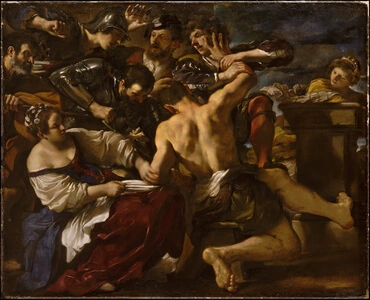Batalla

La guerra en la palabra representa el combate de la tentación cuando lo que es bueno es asaltado por lo que es malo o falso. El mal que ataca viene de una de las muchas sociedades del infierno y opera despertando un amor egoísta en nuestra mente que es contrario a lo que sabemos que es correcto. Entonces nuestro amor egoísta ataca el amor que alimenta el deseo de ser una buena persona y hay guerra en nuestras mentes. Esto está representado por las guerras que los hijos de Israel lucharon en y alrededor de la tierra de Canaán, de las cuales hay una larga historia en el antiguo testamento. Los amores egoístas abundan en nuestras mentes desde nuestra herencia, y los buenos amores se prolongan en nuestra conciencia a medida que se desarrolla. Si no tuviéramos conciencia no podríamos ser tentados, seguiríamos inmediatamente los deseos de nuestro egoísmo y nos rendiríamos. Pero entonces el resultado final es que estamos en la esclavitud de los infiernos y haremos lo que ellos quieran.
(Odkazy: Arcana Coelestia 1659 [3], 1664, 1683, 1788 [2])
Arcana Coelestia # 1659
1659. THE INTERNAL SENSE
The details contained in this chapter appear as if they were not representative, for the subject is merely the wars between a number of kings, and Lot's reclamation by Abram, and, towards the end, Melchizedek; so that these details do not seem to possess a single heavenly arcanum within them. Yet like all such details, these conceal very deep arcana in the internal sense which follow in a continuous sequence from the things preceding them, and also link themselves in a similar sequence to those that follow.
[2] The descriptions which precede have dealt with the Lord and the instruction He received, and also with His External Man which was to be joined to the internal by means of knowledge and cognitions. But because His external Man was such, as has been stated, that from what was inherited from the mother it had within it things which prevented their becoming joined together, things which had first to be cast out by means of conflicts and temptations before His external Man could be united to the Internal - that is, His Human Essence to the Divine Essence - this chapter therefore deals with those conflicts themselves. The latter in the internal sense are represented and meant by the wars which it describes. Within the Church it is well known that Melchizedek represented the Lord, and that the Lord is thus meant in the internal sense when Melchizedek is spoken of. From this one may also conclude that not only such details regarding Melchizedek but all others are indeed representative, for not one small word can have been written in the Word that has not been sent down from heaven and consequently in which angels do not see heavenly things.
[3] In most ancient times furthermore many things were represented by wars, which people called 'The Wars of Jehovah'. The latter meant nothing other than the conflicts fought by the Church and by those who belonged to the Church, that is, their temptations, which are nothing else than battles and wars against the evils present within themselves and so against the devil's crew who activate evils and endeavour to destroy the Church and the member of the Church. That wars in the Word have no other meaning becomes quite clear from the fact that the Word cannot have as its subject anything other than the Lord, His kingdom, and the Church, since it is Divine, not human, and consequently heavenly, not worldly. This being so the wars described in the sense of the letter cannot have any other meaning in the internal sense. This may become clearer still from what follows.






